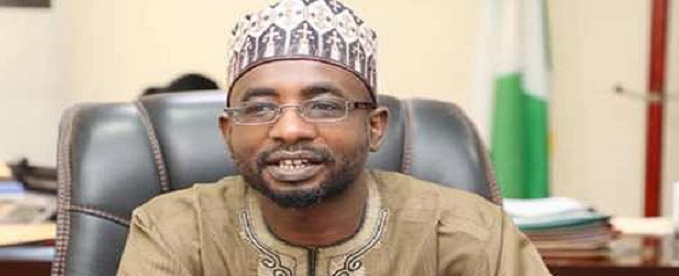Telecom
NITDA to Collaborate with Baze University on Innovation and Entrepreneurship

In its commitment to implement the Strategic RoadMap and Action Plan SRAP 2021-2024, the National Information Technology Development Agency NITDA, has identified Innovation and Entrepreneurship, a pillar in the SRAP document, as one of the driving forces to place Nigeria as a key entrepreneurial country in Africa, and that will become the basis of collaboration between NITDA and Baze University.

Mallam Kashifu Inuwa, director general of NITDA, made this assertion at the 1st Baze University’s ‘Information Technology, Research, and Innovation week’ in Abuja.
Inuwa stated that NITDA is putting a lot of efforts and resources in ensuring that the bulk of graduates from universities and other tertiary institutions are focused on creating jobs rather than seeking for jobs.
The NITDA boss who was represented by the National Director of National Centre for Artificial Intelligence and Robotics, NCAIR, Engineer Yau Garba, affirmed that the Agency, being the IT regulator in the country, and through the implementation of the National Digital Economy Policy and Strategy, NDEPS, is working with startups as key contributors to developing an entrepreneur economy.
Mallam Inuwa noted major subsidiaries of NITDA that cater for entrepreneurial activities are the Office for IT Innovation and Entrepreneurship (OIIE) and the Office for Nigerian Content (ONC) which were merged to become Office for Nigerian Digital and Innovation (ONDI).
“We also have the National Centre for Artificial Intelligence and Robotics, whose core mandate is to conduct Research and Development in emerging technologies such as Artificial Intelligence AI, Drones, Block Chain, Internet of things IoT, etc,” he said.
He added that other activities of the Centre focuses on Capacity Building and Partnerships with relevant Agencies and Universities in areas of national interest that challenge the nation.
Referring to the topic of the session “Challenges and Opportunities of Entrepreneurship Startups”, Inuwa mentioned that the Agency deals with companies that have global impact to solve challenges and create entrepreneur opportunities.
“While the focus is not about profiting”, he explained that ventures like Risk Capitalists and Angel Investors promote businesses that produces substantial number of jobs such as Uber, Jumia and the Nigerian unicorns like Flutterwave and Paystack needs to be replicated as much as possible to ensure a digital economy,” he added.
Inuwa mentioned that the Agency has the support of some international organizations like Japan International Cooperation Agency on new models for incubation and acceleration programmes.
“We have a project called Hives. The idea is to build Centres within the Universities to support students’ and the lecturers’ learning and research development”, he said.
He further noted that the Centre would be based on practical and not the usual courses on entrepreneurship to ensure the promotion of true entrepreneurial activities right from the University towards industrialization.
He charged the students to look forward to being a force in the Fourth Industrial Revolution, adding that “Nigeria must not be left behind, hence, the reason we are looking forward to collaborating with Baze University in search of people who are willing to take risks and scale their ideas to provide jobs and create innovations that would make the world a better place”.
Telecom
NCC Orders Telcos Inform Subscribers of Data Breach within 48 Hours

Nigerian Communications Commission (NCC) has directed telecom operators in the country to notify affected customers of any data breach within 48 hours ( that is two day) of detecting such unauthorised infringement.

This directive was contained in the revised Internet Code of Practice 2026 by the NCC, on Friday.
The document seeks to define the rights and obligations of telecom operators in handing the rights of internet users to an open internet.
In the move to protect customer information, Mobile Network Operators (MNOs) and Internet Service Providers (ISPs) are to take necessary measures to protect customers’ data from unauthorised use, disclosure, access or breach.
Telecom operators must now notify affected customers within 48 hours of detecting a compromise through text message, email or any other effective means. As contained in Chapter 3.4 of the regulation titled “Data Breach Notifications,”
The telecoms companies are also directed to notify the NCC of such a breach not later than 48 hours after determining such a breach.
“Where full details of the breach are not immediately available, the provider shall issue a preliminary notification within the same period and furnish a comprehensive update within Fourteen (14) days thereafter, or within such extended period as the Commission may approve,” part of the section reads.
The guidelines, according to NCC, are in tandem with the provisions contained in the Nigerian Data Protection Act 2023 and Part VI of Schedule 1 of the Consumer Code of Practice Regulations 2024.
The regulation also joins other agencies’ policies, ensuring protection. Agencies such as the Nigeria Data Protection Commission (NDPC) and the Federal Competition and Consumer Protection Commission (FCCPC) protect consumers against misuse of personal data, identity theft, financial loss, and reputation damage.
The review comes at a time when privacy becomes core amid frequent breaches and illegal harvest of data such as biometric, national IDs, financial information, traffic and usage, and others.
Regulations are necessary for the proper handling, consent, and regulatory compliance regarding sensitive data, ensuring it is only processed for legitimate purposes.
Under Chapter 3.5, the Internet Code of Practice 2026 addressed the handling of harvesting of transactional data by notifying and getting approval from the NCC of any usage by a third party. It noted that the NCC approval will be defined by a review and assessment of such access and “its potential effects on national considerations, consumer information and personal data.”
Telecom
Globacom Promotes Valentine Gifting with Huge Discounts on Smartphones

Globacom has announced a Valentine Smartphone promotion, which provides incredible savings on a variety of high-end smartphones from top manufacturers including Tecno, Samsung, and Infinix.

Starting on February 9, the promotion provides substantial price reductions on a number of Samsung models, including the Galaxy Z Fold 7, Galaxy A07, Galaxy A56 5G, Galaxy A36 5G, and Galaxy A26 5G. Customers who buy any of the phones will also receive a complimentary travel pouch and charger, as well as up to 18GB of extra data for six months, only available on the Glo network.
Along with other Infinix models, Tecno devices are also offered at attractive discounts, giving customers a large range of smartphones to fit a variety of tastes and price ranges.
The goal of the Glo Valentine promotion is to provide customers with the best possible deals on carefully chosen smartphones that are renowned for their cutting-edge technology, stylish designs, and dependable performance. The offer, which includes alternatives to suit a range of budgets and lifestyles, reaffirms Globacom’s dedication to customer happiness, digital adoption, greater data usage, and client centricity.
The company revealed that the promotion aligned with customers’ expectations during celebratory seasons, when demand is highest for quality smartphones at affordable prices. The company added that its partnership with trusted global and regional brands such as Samsung, Infinix, and Tecno ensures that customers enjoy premium features without compromising on value.
“The Valentine season is about connection, and what better way to stay connected than with a smartphone that fits your needs and aspirations,” the company stated. “This promo gives our customers the chance to get their dream smartphones at some of the best prices of the year, along with generous data bonuses to keep them connected,” the company disclosed.
Customers are encouraged to visit Gloworld outlets nationwide to take advantage of the Valentine Smartphone Promo while stocks last.
Telecom
GBB Expands Broadband to 13 Underserved Communities In 2025

Galaxy Backbone Limited (GBB) has recorded a significant milestone in Nigeria’s digital transformation journey by advancing broadband connectivity to 13 underserved institutions and communities nationwide in 2025, reinforcing its position as the nation’s digital backbone and a trusted partner in national development.

Guided by its mandate to enable a digitally inclusive Nigeria, GBB deliberately extended connectivity to locations within reach of its infrastructure footprint, particularly institutions with strong potential for productive use but limited readiness for immediate commercial engagement. Through this effort, the organisation continues to unlock opportunity, stimulate innovation, and support sustainable growth across critical sectors of the economy.
The expansion reached three Federal Universities, two Local Government Areas, and eight Federal Secretariats, strengthening digital capabilities in education and public administration while enhancing service delivery across the country.
GBB also extended reliable broadband connectivity to strategic and cultural landmarks such as the Nnamdi Azikiwe International Airport, Abuja, underscoring its commitment to supporting national infrastructure that drives economic activity, mobility, and global connectivity.
These deployments highlight Galaxy Backbone’s resolve to bridge the digital divide and empower institutions that shape Nigeria’s future. They demonstrate the measurable national impact of GBB’s infrastructure investments and reflect the tangible progress of the Integrated Digital Transformation Strategy (IDTS), further solidifying the organisation’s role as the platform upon which government institutions and communities can confidently build their digital future.
More importantly, the milestone illustrates that GBB’s work extends beyond technology by enabling education, improving governance, supporting economic participation, and connecting citizens to opportunity.
The initiative aligns with the Federal Government’s broadband penetration objectives and complements national programmes such as Project 774 – Universities’ Hostel Connectivity, ensuring coordinated, scalable, and sustainable impact across the country. Commenting on the achievement, Galaxy Backbone noted that every new connection brings Nigeria closer to a more inclusive digital economy while reinforcing the infrastructure required for innovation and national competitiveness.
As implementation continues, GBB remains committed to expanding access, pushing boundaries, and delivering on the promise of a fully digital nation, with further updates expected as additional phases of the deployment progress.
Galaxy Backbone Limited is the Federal Government’s digital infrastructure and shared services provider, dedicated to delivering secure, reliable, and scalable ICT solutions that support efficient governance, innovation, and sustainable national development.

 E-Financial3 days ago
E-Financial3 days agoBillions in Nigeria’s Reserves, But Where is the Growth?

 Telecom3 days ago
Telecom3 days agoQNET unveils ‘Energize Everyday’ theme, intensifies consumer protection, media partnership in 2026

 News2 days ago
News2 days agoNITDA Explores Partnership with Trust Stamp on Digital Trust and Innovation

 E-Financial3 days ago
E-Financial3 days agoAdedeji, NRS Boss says Technology is Crucial to Tax Reform’s Success

 E-Financial2 days ago
E-Financial2 days agoNAICOM Targets Resilient, Global Competition Market in Insurance Sector Consolidation

 E-Business3 days ago
E-Business3 days agoKaspersky Reports 15% Growth in Malicious email Attacks in 2025

 News3 days ago
News3 days agoNDIC Moves to Boost Customers’ Confidence in Nigerian Banks

 General News3 days ago
General News3 days agoRussia Blocks WhatsApp, Pushes State App Max as Alternative Amid Telegram Clampdown























